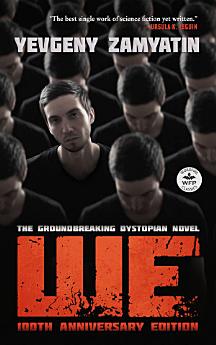We: 100th Anniversary Edition
Jun 2021 · WordFire +ORM
Ebook
268
Pages
family_home
Eligible
info
reportRatings and reviews aren’t verified Learn More
About this ebook
The groundbreaking dystopian novel that inspired 1984 and Brave New World. “The best single work of science fiction yet written.” —Ursula K. Le Guin
When society has programmed you to sleep . . .
How do you wake yourself up?
The One State is a world where people are merely numbers, and free will itself is a disease. Most are happy in their role as cogs in a huge machine, controlled by the ever-watchful Benefactor.
However, on the eve of the launch of the Integral—the spacecraft that will impose the One State’s way of life everywhere—starship architect D-503 meets I-330, a female number as irreverent as she is beautiful.
The Benefactor has quantified human experience, circumscribed edit, reduced it to nothing but a series of mathematical equations—that is, until one man tries to factor in the ultimate unknown: love.
Before Huxley. Before Orwell. There was Zamyatin.
Discover it for yourself today.
Bonus: includes Zamyatin’s famous “Death Sentence Appeal” letter to Stalin, and “Love Is the Function of Death” a bold new essay by noted science fiction author, reviewer, and scholar Paul Di Filippo.
“How could I have missed one of the most important dystopias of the 20th century? . . . I was amazed by it.” —Margaret Atwood
“One of the literary curiosities of this book-burning age.” —George Orwell
When society has programmed you to sleep . . .
How do you wake yourself up?
The One State is a world where people are merely numbers, and free will itself is a disease. Most are happy in their role as cogs in a huge machine, controlled by the ever-watchful Benefactor.
However, on the eve of the launch of the Integral—the spacecraft that will impose the One State’s way of life everywhere—starship architect D-503 meets I-330, a female number as irreverent as she is beautiful.
The Benefactor has quantified human experience, circumscribed edit, reduced it to nothing but a series of mathematical equations—that is, until one man tries to factor in the ultimate unknown: love.
Before Huxley. Before Orwell. There was Zamyatin.
Discover it for yourself today.
Bonus: includes Zamyatin’s famous “Death Sentence Appeal” letter to Stalin, and “Love Is the Function of Death” a bold new essay by noted science fiction author, reviewer, and scholar Paul Di Filippo.
“How could I have missed one of the most important dystopias of the 20th century? . . . I was amazed by it.” —Margaret Atwood
“One of the literary curiosities of this book-burning age.” —George Orwell
About the author
Zamyatin studied at the Polytechnic Institute in St. Petersburg and became a professional naval engineer. His first story appeared in 1908, and he became serious about writing in 1913, when his short novel A Provincial Tale (1913) was favorably received. He became part of the neorealist group, which included Remizov and Prishvin. During World War I, he supervised the construction of icebreakers in England for the Russian government. After his return home, he published two satiric works about English life, "The Islanders" (1918) and "The Fisher of Men" (1922). During the civil war and the early 1920s, Zamyatin published theoretical essays as well as fiction. He played a central role in many cultural activities---as an editor, organizer, and teacher of literary technique---and had an important influence on younger writers, such as Olesha and Ivanov. Zamyatin's prose after the Revolution involved extensive use of ellipses, color symbolism, and elaborate chains of imagery. It is exemplified in such well-known stories as "Mamai" (1921) and "The Cage" (1922). His best-known work is the novel We (1924), a satiric, futuristic tale of a dystopia that was a plausible extrapolation from early twentieth-century social and political trends. The book, which directly influenced George Orwell's (see Vol. 1) 1984, 1984, was published abroad in several translations during the 1920s. In 1927 a shortened Russian version appeared in Prague, and the violent press campaign that followed led to Zamyatin's resignation from a writers' organization and, eventually, to his direct appeal to Stalin for permission to leave the Soviet Union. This being granted in 1931, Zamyatin settled in Paris, where he continued to work until his death. Until glasnost he was unpublished and virtually unknown in Russia.
Rate this ebook
Tell us what you think.
Reading information
Smartphones and tablets
Install the Google Play Books app for Android and iPad/iPhone. It syncs automatically with your account and allows you to read online or offline wherever you are.
Laptops and computers
You can listen to audiobooks purchased on Google Play using your computer's web browser.
eReaders and other devices
To read on e-ink devices like Kobo eReaders, you'll need to download a file and transfer it to your device. Follow the detailed Help Center instructions to transfer the files to supported eReaders.








